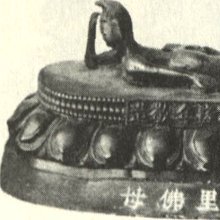Pashi, Pāśī: 13 definitions
Introduction:
Pashi means something in Hinduism, Sanskrit, Marathi, Jainism, Prakrit, Hindi, biology, Tamil. If you want to know the exact meaning, history, etymology or English translation of this term then check out the descriptions on this page. Add your comment or reference to a book if you want to contribute to this summary article.
The Sanskrit term Pāśī can be transliterated into English as Pasi or Pashi, using the IAST transliteration scheme (?).
Images (photo gallery)
In Hinduism
Purana and Itihasa (epic history)
Source: archive.org: Puranic EncyclopediaPāśī (पाशी).—One of the hundred sons of Dhṛtarāṣṭra. Bhīma killed him in the great battle. (Śloka 5, Chapter 84, Karṇa Parva).
Source: JatLand: List of Mahabharata people and placesPāśī (पाशी) is a name mentioned in the Mahābhārata (cf. I.108.11) and represents one of the many proper names used for people and places. Note: The Mahābhārata (mentioning Pāśī) is a Sanskrit epic poem consisting of 100,000 ślokas (metrical verses) and is over 2000 years old.

The Purana (पुराण, purāṇas) refers to Sanskrit literature preserving ancient India’s vast cultural history, including historical legends, religious ceremonies, various arts and sciences. The eighteen mahapuranas total over 400,000 shlokas (metrical couplets) and date to at least several centuries BCE.
Biology (plants and animals)
Source: Wisdom Library: Local Names of Plants and DrugsPasi in the Urdu language is the name of a plant identified with Terminalia pendula (Edgew.) Gere & Boatwr. from the Combretaceae (Rangoon creeper) family having the following synonyms: Anogeissus pendula. For the possible medicinal usage of pasi, you can check this page for potential sources and references, although be aware that any some or none of the side-effects may not be mentioned here, wether they be harmful or beneficial to health.
Source: Google Books: CRC World Dictionary (Regional names)Pasi in India is the name of a plant defined with Dalbergia paniculata in various botanical sources. This page contains potential references in Ayurveda, modern medicine, and other folk traditions or local practices It has the synonym Amerimnon paniculatum (Roxb.) Kuntze (among others).
Example references for further research on medicinal uses or toxicity (see latin names for full list):
· Bulletin of the Botanical Survey of India (1983)
· Revisio Generum Plantarum (1891)
· Plants of the Coast of Coromandel (1798)
If you are looking for specific details regarding Pasi, for example diet and recipes, extract dosage, side effects, pregnancy safety, chemical composition, health benefits, have a look at these references.

This sections includes definitions from the five kingdoms of living things: Animals, Plants, Fungi, Protists and Monera. It will include both the official binomial nomenclature (scientific names usually in Latin) as well as regional spellings and variants.
Languages of India and abroad
Marathi-English dictionary
Source: DDSA: The Molesworth Marathi and English Dictionarypāśī (पाशी) [or पांशी, pāṃśī].—f C (Or phāṃśī) A disease arising to cattle from their not being led to water at the seasons.
Source: DDSA: The Aryabhusan school dictionary, Marathi-Englishpāśī (पाशी).—f A cattle disease.
Marathi is an Indo-European language having over 70 million native speakers people in (predominantly) Maharashtra India. Marathi, like many other Indo-Aryan languages, evolved from early forms of Prakrit, which itself is a subset of Sanskrit, one of the most ancient languages of the world.
Sanskrit dictionary
Source: Cologne Digital Sanskrit Dictionaries: Edgerton Buddhist Hybrid Sanskrit DictionaryPāṣī (पाषी).—(not found elsewhere; perhaps compare paṃ- sayati; AMg. paṃsei is rendered defiles), dung: pāṣī Mahāvyutpatti 5309 = Tibetan lud, dung; pāṣiṃ, acc., Mūla-Sarvāstivāda-Vinaya ii.33.10 = Tibetan lci ba, (especially) cow-dung.
Pāṣī can also be spelled as Pāṣi (पाषि).
Source: Cologne Digital Sanskrit Dictionaries: Monier-Williams Sanskrit-English Dictionary1) Pāśī (पाशी):—[from pāśa] a f. a rope, fetter, [Śiśupāla-vadha xviii, 57] (cf. also 2. pāśī).
2) 2. pāśī f. (for 1. See under pāśa) a stone, [Kauśika-sūtra 83; 85] ([varia lectio] pasī; cf. pāṣaṇa, pāṣī).
3) Pāṣī (पाषी):—[from pāṣāṇa] f. = silā, a stone or = śakti, a spear, [Sāyaṇa on Ṛg-veda i, 56, 6] (cf. 2. pāśī).
4) Pāsī (पासी):—[from pāsa] f. [varia lectio] for pāśī.
[Sanskrit to German]
Sanskrit, also spelled संस्कृतम् (saṃskṛtam), is an ancient language of India commonly seen as the grandmother of the Indo-European language family (even English!). Closely allied with Prakrit and Pali, Sanskrit is more exhaustive in both grammar and terms and has the most extensive collection of literature in the world, greatly surpassing its sister-languages Greek and Latin.
Hindi dictionary
Source: DDSA: A practical Hindi-English dictionaryPāsī (पासी):—(nm) a low caste amongst the Hindus.
...
Prakrit-English dictionary
Source: DDSA: Paia-sadda-mahannavo; a comprehensive Prakrit Hindi dictionaryPāsi (पासि) in the Prakrit language is related to the Sanskrit word: Pārśvin.
Prakrit is an ancient language closely associated with both Pali and Sanskrit. Jain literature is often composed in this language or sub-dialects, such as the Agamas and their commentaries which are written in Ardhamagadhi and Maharashtri Prakrit. The earliest extant texts can be dated to as early as the 4th century BCE although core portions might be older.
Kannada-English dictionary
Source: Alar: Kannada-English corpusPasi (ಪಸಿ):—
1) [verb] (the stomach) to have the discomfort, pain or weakness caused by a need for food; to need food; to become hungry.
2) [verb] to fast for a religious purpose.
3) [verb] (fig.) to have in intense and prolonged desire.
4) [verb] (fig.) to have greed, covetousness.
--- OR ---
Pasi (ಪಸಿ):—[noun] = ಪಸಿವು [pasivu].
--- OR ---
Pasi (ಪಸಿ):—
1) [noun] anything that is green, new or fresh.
2) [noun] the quality or state of being wet, moistened, soaked in water, etc.; wetness; dampness.
3) [noun] a seed of a plant that is not yet ripened.
4) [noun] the green colour.
5) [noun] the quality of being raw, not cooked, baked, dried, etc.; rawness.
6) [noun] lack of emotional maturity, sense of responsibility, refinement, etc.
7) [noun] the quality of being oily; oiliness.
8) [noun] that part which forms the core, essence of a thing.
9) [noun] ಪಸಿಯಡಕೆ [pasiyadake] pasiyaḍake areca nut that is not cooked or dried; ಪಸಿಯ ಬಿಸಿಲ್ [pasiya bisil] pasiya bisil the sunlight in the early hours of the day (which is not scartching).
--- OR ---
Pāśi (ಪಾಶಿ):—[noun] = ಪಾಶಪಾಣಿ [pashapani].
--- OR ---
Pāśi (ಪಾಶಿ):—[noun] = ಪಾಸಿ [pasi]3.
--- OR ---
Pāsi (ಪಾಸಿ):—[noun] = ಪಾಸೆ [pase]1.
--- OR ---
Pāsi (ಪಾಸಿ):—[noun] Yama or Varuṇa who holds a length of rope (with a noose at one end).
--- OR ---
Pāsi (ಪಾಸಿ):—[noun] the death sentence by hanging.
--- OR ---
Pāsi (ಪಾಸಿ):—[noun] = ಪಾಸೆ [pase]2.
Kannada is a Dravidian language (as opposed to the Indo-European language family) mainly spoken in the southwestern region of India.
See also (Relevant definitions)
Starts with: Pashi-ppattam, Pashige, Pashika, Pashikrita, Pashikusha, Pashikya, Pashila, Pashim, Pashin, Pashing, Pashini, Pashipadeh, Pashisaja, Pashishta, Pashita, Pashitam, Pashitapetam, Pashivata.
Ends with (+7): Abapashi, Campashi, Devakapashi, Dhempashi, Ekashengakapashi, Hapashi, Hiragunda Kapashi, Indrakapashi, Jangalikapashi, Kapashi, Keshapashi, Lapashi, Padapashi, Pashupashi, Raan-kapashi, Ran-kapashi, Ranakapashi, Sanukapashi, Shetakapashi, Tapasi.
Full-text (+69): Pashim, Pem, Pasana, Pasi-payaru, Tuvipashi, Abhishtipa, Pacitinnutal, Sambokhanem, Pashi-ppattam, Pashivata, Pashikrita, Mujakata kwa pasi, Muhacha kwa pasi, Pashisaja, Venpaci, Parshvin, Varavasya, Mushakata kwa pasi, Varapashi, Banka-pasi.
Relevant text
Search found 18 books and stories containing Pashi, Pāśī, Pasi, Pāṣī, Pāṣi, Pāsī, Pāsi, Pāśi; (plurals include: Pashis, Pāśīs, Pasis, Pāṣīs, Pāṣis, Pāsīs, Pāsis, Pāśis). You can also click to the full overview containing English textual excerpts. Below are direct links for the most relevant articles:
Garga Samhita (English) (by Danavir Goswami)
Verse 6.3.9 < [Chapter 3 - Lord Balarāma’s Wedding]
Verse 2.15.28 < [Chapter 15 - Description of Śrī Rādhā-Kṛṣṇa’s Falling in Love]
Rig Veda (translation and commentary) (by H. H. Wilson)
List of Mahabharata people and places (by Laxman Burdak)
Chaitanya Bhagavata (by Bhumipati Dāsa)
Verse 3.1.253 < [Chapter 1 - Meeting Again at the House of Śrī Advaita Ācārya]
Puranic encyclopaedia (by Vettam Mani)
Vedic influence on the Sun-worship in the Puranas (by Goswami Mitali)
Part 3 - Sūrya, the Creator, the Preserver and the Destroyer < [Chapter 4 - Vedic Influence on the Sun-Worship in the Purāṇas]
Related products

